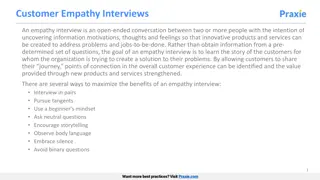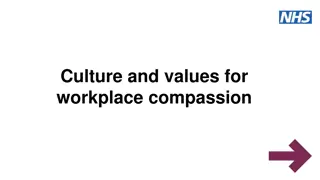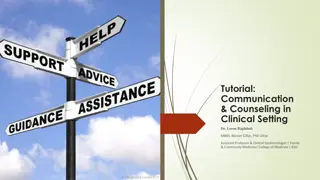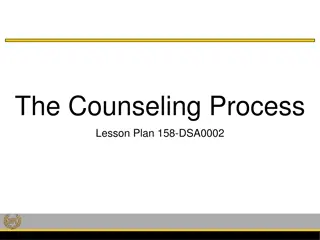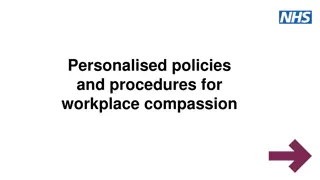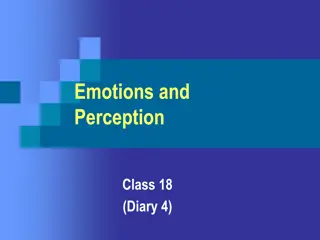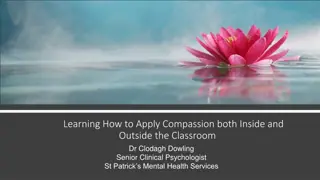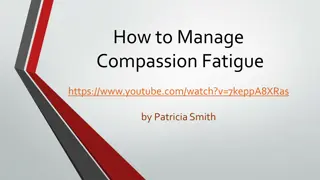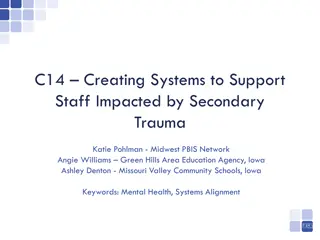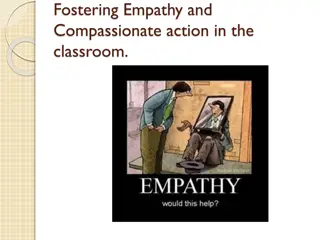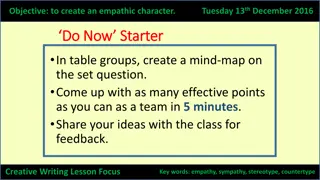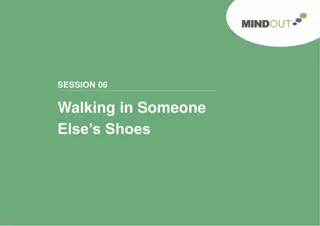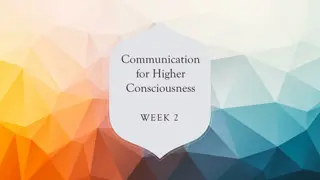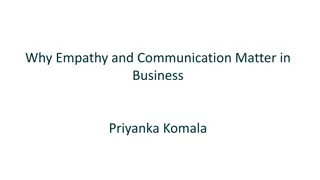Empathy and Compassion in Counseling
Empathy is the ability to recognize and understand the emotions of others, while compassion involves feeling motivated to alleviate their suffering. As a school counselor, practicing empathy involves listening, understanding, and validating the perspectives of students. Tips for developing empathy include challenging biases, finding common ground, and empathizing with adversaries. Compassion takes empathy further by inspiring action to relieve suffering on a universal level.
Download Presentation

Please find below an Image/Link to download the presentation.
The content on the website is provided AS IS for your information and personal use only. It may not be sold, licensed, or shared on other websites without obtaining consent from the author.If you encounter any issues during the download, it is possible that the publisher has removed the file from their server.
You are allowed to download the files provided on this website for personal or commercial use, subject to the condition that they are used lawfully. All files are the property of their respective owners.
The content on the website is provided AS IS for your information and personal use only. It may not be sold, licensed, or shared on other websites without obtaining consent from the author.
E N D
Presentation Transcript
Presented by Toni R. Tollerud, Ph.D. LCPC. NCC. NCSC. ACS Distinguished Teaching Professor Professor Emeritis College of Education, Northern Illinois University VALEES, Thursday, April 14, 2016
Often defined as one of the most important basic skills a counselor learns and practices in session. How would you define empathy ? How do you practice empathy in your work as a school counselor?
More than simply listening Understand how someone feels, and then trying to imagine how that might feel for you Empathy is a way of relating to our clients I share your emotions The ability to identify with or understand another's situation or feelings the psychological identification with or vicarious experiencing of the feelings, thoughts, or attitudes of another Empathy is simply recognizing emotions in others, and being able to "put yourself in another person's shoes" understanding the other person's perspective and reality.
TIPS FOR DEVELOPING COUNSELOR EMPATHY WITH YOUR STUDENTS Cultivate a curiosity with your clients Challenge your own biases and prejudices Find commonalities Try-on another person s life Use your best listening skills validate the other person s perspective Do not judge Open yourself us and allow yourself to be vulnerable Empathize with your adversaries acknowledgement doesn t mean agreement
In what ways do you think you act with compassion when you are working with your students? Research tells us that empathy is the gateway to compassion, but that compassion pushes us to go a step further.
Compassion means to suffer together. It involves feelings that arise when you are confronted with another s suffering and you feel motivated to relieve that suffering. The English noun compassion means to love together with another With empathy, I share your emotions; with compassion I not only share your emotions but elevate them into a universal and transcending experience of action.
Look for the commonalities with your clients Be mindful avoid excessive fear and worry Use cooperation instead of competition See your clients as individuals Avoid blaming Respect your inner hero-believe YOU can make a difference Model kindness Be aware of your own good feelings when you engage in compassionate behaviors
Consider the following question: As counselors, we are constantly impacted by the clients we work with both in positive ways and in negative ways! Identify how client issues have impacted you.
Each day we are trusted with the deepest, darkest, most difficult situations and secrets of those who come to us. These stories are heart-wrenching as they impact employment, job security, relationships, self- concept and even life/death. Individuals come to us seeking help and relief, alternatives and options, change and resolution.
Counselors who do it right by exhibiting empathy and compassion with clients, cannot help but feel emotional, physical, and mental fatigue. This fatigue can be similar to vicarious posttraumatic stress disorders. It Pops out of us in many ways
Given what we are asked to address in our jobs, it is clear that if we do not work to properly care for ourselves, we become prone to many outcomes as a result, including physical, mental, and emotional issues. Can include: Stress and Anxiety Burnout Compassion Fatigue Headaches Heart Related Illness Stomach ailments, etc Without self care, we cannot maintain the capacity to care of those who seek us out for help in our role. We do them a disservice and can even do harm.
What are some of the signs you have noticed in others and in yourself that may be indications of potential burnout? Dragging oneself to work and then avoiding clients Giving up during a session or ending it early Missing appointments (or missing work altogether) Being late An increase in judgmental feelings or feeling bitter or resentful Forgetting to behave ethically Resenting the classroom teacher or administrators Daydreaming about other people, places, situations, lives, lifestyles, times, etc. Having the inability to enjoy free or leisure time Increased/excessive drinking, drug use, or eating to relieve or cope with stress. Feeling as though your work comes home with you and being unable to get your clients out of your mind. Feeling a sense of vicarious trauma from hearing clients stories.
Arises when assertiveness-goal achievement intentions are not met A state of physical, mental and emotional exhaustion as a result of long term involvement with difficult and demanding situations Emerges out of workplace problems that include long working hours, salary issues, downsizing, policy changes, not feeling understood by the administrators or colleagues, etc. Occurs over time
Compassion fatigue can also be known as secondary traumatic stress and can result in a gradual lessening of compassion over time. We become over-sensitized. It builds up as a result of the emotional residue or strain of exposure to working with those suffering from the consequences of traumatic events. Can be due to a cumulative level of trauma. Compassion fatigue is about relationships and connections. It can come on very fast as a result of feeling that the caregiver has been unsuccessful at taking care of the client, leading to feelings of distress and guilt. Both burnout and compassion fatigue leave you feeling frustration, powerlessness, and diminished morale.
Compassion fatigue can be the result of experiencing an intense emotional or interpersonal connection associated with a tragedy, a social injustice, or an inequity. The 'burnt out' professional helper gradually withdraws, the 'compassionately fatigued' professional works harder to give even more to the client in need. The result is feeling depleted, depressed, helpless ..hopeless
First and formost.we must be good self-care. professionals. If we need to give to others in our work, then there must be something to GIVE. Avoid emotional bankruptcy! Work at leaving it at the office. Pay attention to our own emotional climate and psychological state and continually assess these. Avoid saying I can push through this or I am fine! Work to refocus and rescript our reality.
What do you currently do to address issues in your work that may be contributing to burnout or to compassion fatigue? Engage in things that bring you joy and relieve stress.
Decide on a time of the day when you will focus on leisure. Take up a new hobby, or revisit one from your past that you enjoyed. Take time each day to relax, even if it is only for half an hour. Avoid taking on extra clients if your caseload is full. Avoid taking on extra work-related responsibilities if you are feeling overwhelmed or spread too thin. Learn to say no to yourself. Avoid starting a new article, book chapter, or presentation, taking on a new trainee, etc. if you do not feel ready to do so yet. Keep your supervision appointments and receive supervision regularly, discussing your concerns. This is where our colleagues and mentors can shed light on our situation. Sometimes an outsider s perspective helps! Receive counseling of your own to manage any difficult feelings you are experiencing. Read non-professional literature. Read or learn for fun. (Yes, it is possible.) Routinely assess where you stand in regard to your personal state. Reflect on your personal well-being.
Do: Find someone to talk to. Understand that the pain you feel is normal. Exercise and eat properly. Get enough sleep. Take some time off. Develop interests outside of medicine. Identify what s important to you. Don t: Blame others. Look for a new job, buy a new car, get a divorce or have an affair. Fall into the habit of complaining with your colleagues. Hire a lawyer. Work harder and longer. Self-medicate. Neglect your own needs and interests. Source: Landstuhl Regional Medical Center
Write down one thing you learned about being a more empathic or compassionate counselor? Write down at least two things you are going to do for yourself that you believe will help you avert burn-out or compassion fatigue.
Mother Teresa understood compassion fatigue the best! She required her caregivers to take a year off every 4-5 years to heal from their caregiving roles.
Andreula, T. (2013). Burnout in Mental Health Professionals. Psych Central. Retrieved on July 24, 2015, from http://pro.psychcentral.com/burnout-in-mental-health- professionals/00771.html Portnoy, D. (2011). Burnout and compassion fatigue: Watch for the Signs. Health Progress, The Catolic Health Association of the United States, www.chausa.org. The American Institute of Stress (n.d.) Compassion fatigue. Retrieved on July 27, 2015 from www.stress.org/military/for- practitionersleaders/compassion-fatigue Citation: Lombardo, B., Eyre, C., (Jan 31, 2011) "Compassion fatigue: A nurse s primer" OJIN: The Online Journal of Issues in Nursing Vol. 16, No. 1, Manuscript 3. DOI: 10.3912/OJIN.Vol16No01Man03 Smith, M., Segal, J. & Segal, R. (June, 2015). Preventing burnout: Signs, symptoms, causes, and coping strategies, www. helping Guide.org







